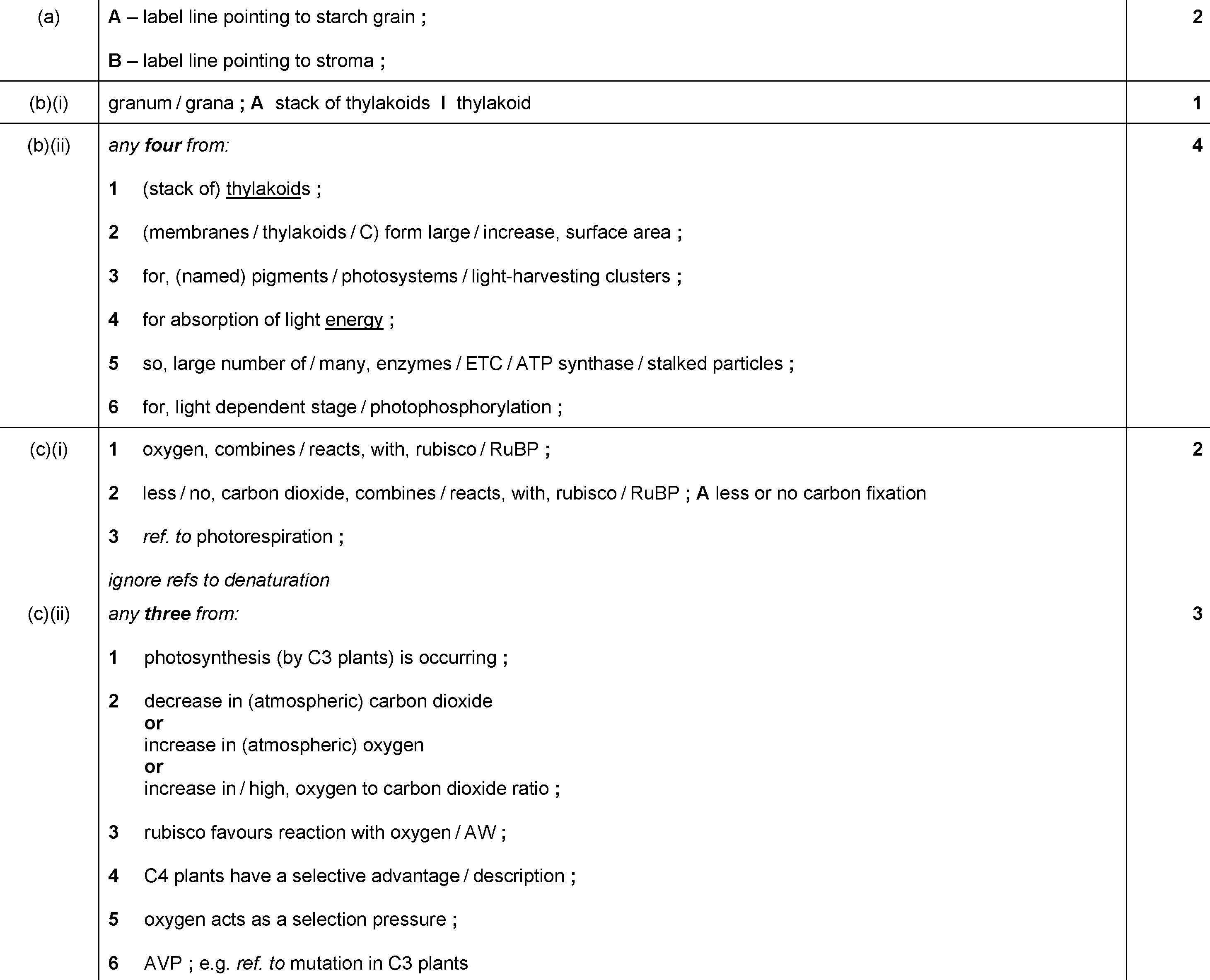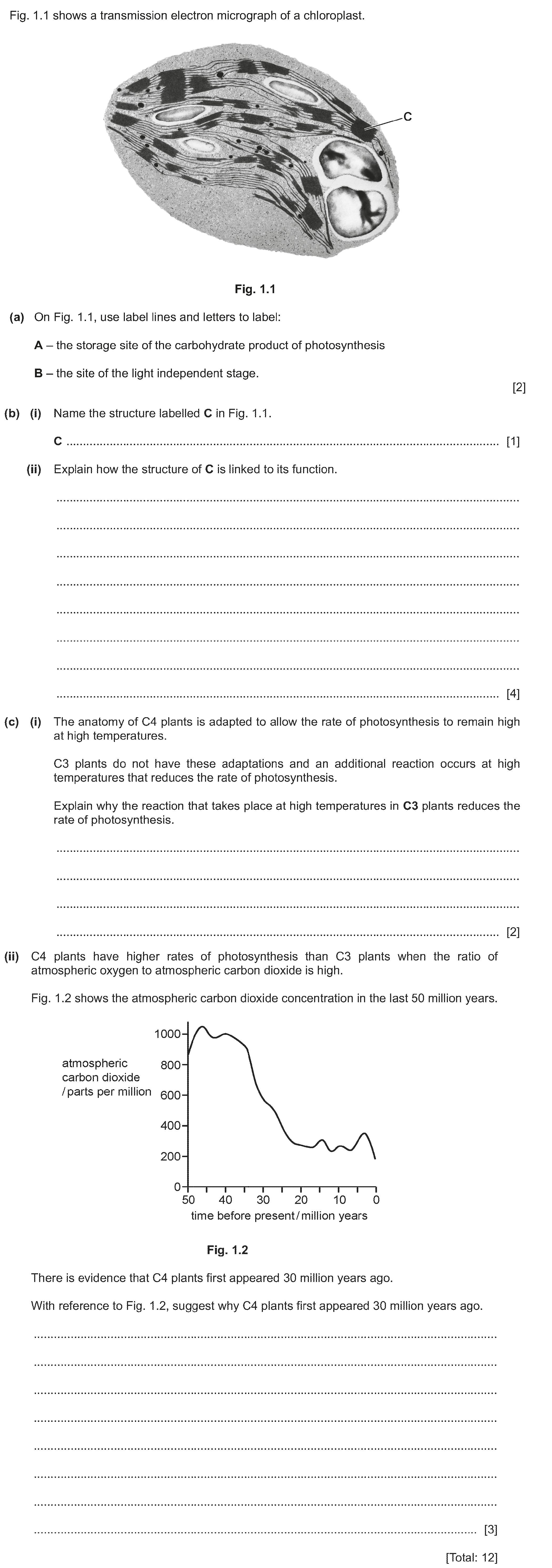
Q1:
AS & A Level Biology - 9700 Paper 4 2020 Winter Zone 2
Questions:
1/10

Topic: CH1 - CELL STRUCTURE
Solution



PRACTISE
Similar Questions

LEARN
Concepts with Sparky

More Questions from this Topic
MCQ
CH1 - CELL STRUCTURE
A student used a light microscope to observe a blood smear on a microscope slide.An eyepiece graticule was used to measure the diameter of a white blo...
2024
 Spring
Spring
 Spring
Spring
 11
11
MCQ
CH1 - CELL STRUCTURE
A prokaryotic cell which is 1\(\mu m\) in diameter is magnified 50 000 times in an electron micrograph.What is the diameter of the cell in the electro...
2024
 Summer
Summer
 Summer
Summer
 3
3
MCQ
CH1 - CELL STRUCTURE
The diagram shows a transverse section through a blood capillary.What is the magnification of the drawing?
2024
 Winter
Winter
 Winter
Winter
 4
4
MCQ
CH1 - CELL STRUCTURE
The diagram shows a stage micrometer scale viewed with an eyepiece graticule, using a magnification of ×200. Using the same magnification, a chloro...
2024
 Summer
Summer
 Summer
Summer
 6
6
MCQ
CH1 - CELL STRUCTURE
The diagram shows a plant cell with some labelled structures. Which labelled structures are bound by a double membrane?
2024
 Summer
Summer
 Summer
Summer
 5
5
MCQ
CH1 - CELL STRUCTURE
Which statement explains why it is necessary to use an electron microscope to see the cristae of a mitochondrion?
2024
 Spring
Spring
 Spring
Spring
 10
10
MCQ
CH1 - CELL STRUCTURE
Which statement explains why lymphocytes with no nucleoli die?
2024
 Winter
Winter
 Winter
Winter
 4
4
MCQ
CH1 - CELL STRUCTURE
Which range of cell diameters is typical for prokaryotic cells?
2024
 Summer
Summer
 Summer
Summer
 5
5
MCQ
CH1 - CELL STRUCTURE
The electron micrograph shows a type of blood cell. What can be concluded from the electron micrograph?
2024
 Summer
Summer
 Summer
Summer
 8
8
MCQ
CH1 - CELL STRUCTURE
Some stains can be used to identify cell structures in living cells.A dilute solution of one stain causes the whole cell to appear blue.The blue colou...
2024
 Spring
Spring
 Spring
Spring
 6
6
More Questions from year 2020
Theory
CH7 - TRANSPORT IN PLANTS
Phloem sap is transported from sources to sinks in phloem sieve tubes. Each sieve tube is constructed from phloem sieve tube elements.
(a) The struct...
2020
 Spring
Spring
 Spring
Spring
 3
3
Theory
CH3 - ENZYMES
Phosphatidate phosphatase (PAP) enzymes have an important role in lipid metabolism.The reaction catalysed by PAP is shown in Fig. 2.1.Experiments were...
2020
 Spring
Spring
 Spring
Spring
 4
4
Theory
CH8 - TRANSPORT IN MAMMALS
During one cardiac cycle:blood enters the heart from the lungs and from the rest of the bodyblood leaves the heart to be transported to the lungs and ...
2020
 Spring
Spring
 Spring
Spring
 4
4
Theory
CH9 - GAS EXCHANGE AND SMOKING
(a) When a section of lung tissue is viewed using a light microscope, it is possible to identify the trachea, the bronchus, the bronchioles and the al...
2020
 Spring
Spring
 Spring
Spring
 3
3
Theory
CH11 - IMMUNITY
Myasthenia gravis and HIV/AIDS both involve disorders of the immune system.(a) Outline why myasthenia gravis is described as a disorder of the immune ...
2020
 Spring
Spring
 Spring
Spring
 3
3
Theory
CH1 - CELL STRUCTURE
Fig. 6.1 is a transmission electron micrograph of a plant parenchyma cell.(a) The external environment of the parenchyma cell has a higher water poten...
2020
 Spring
Spring
 Spring
Spring
 4
4
Theory
CH14 - HOMEOSTASIS
(a) Fig. 1.1 represents part of the wall of a proximal convoluted tubule (pct) in a kidney nephron.
(i) Name the features of the wall of a pct that...
2020
 Spring
Spring
 Spring
Spring
 4
4
Theory
CH11 - IMMUNITY
Severe combined immunodeficiency (SCID) is a group of life-threatening diseases. SCID is caused by mutations that prevent the normal function of the i...
2020
 Spring
Spring
 Spring
Spring
 4
4
Theory
CH16 - INHERITED CHANGE
Flowers of the common morning-glory plant, Ipomoea purpurea, can have several different phenotypes. An example of these flowers is shown in Fig. 3.1.[...
2020
 Spring
Spring
 Spring
Spring
 3
3
Theory
CH16 - INHERITED CHANGE
The rainbow trout, Oncorhynchus mykiss, is a fish that is bred in commercial fish farms. Rainbow trout that have a blue-silver colour are sold at a hi...
2020
 Spring
Spring
 Spring
Spring
 3
3




 Share
Share




 Previous
Previous




